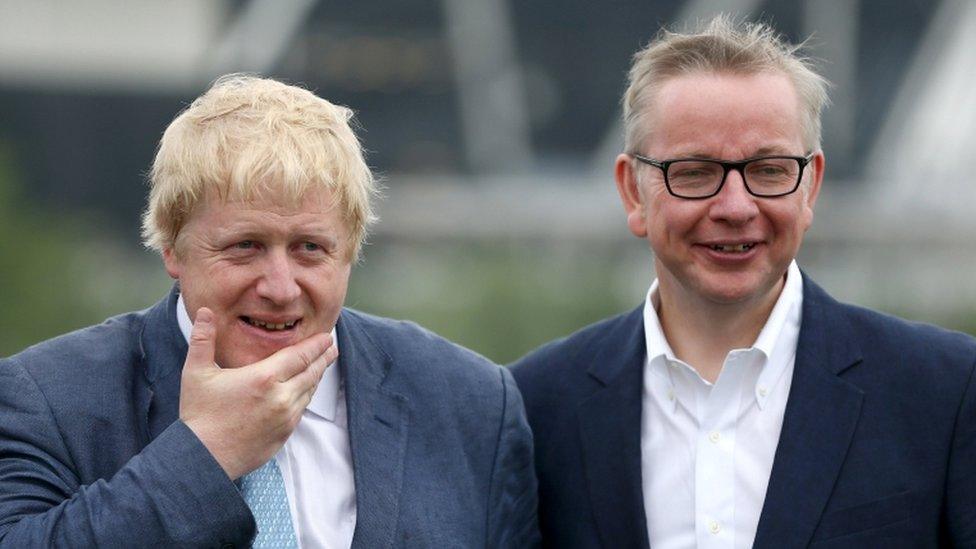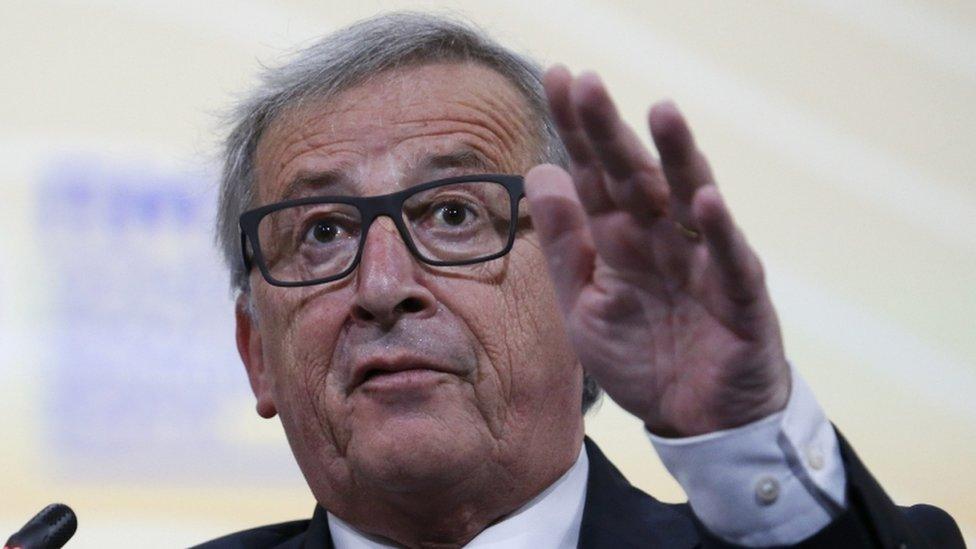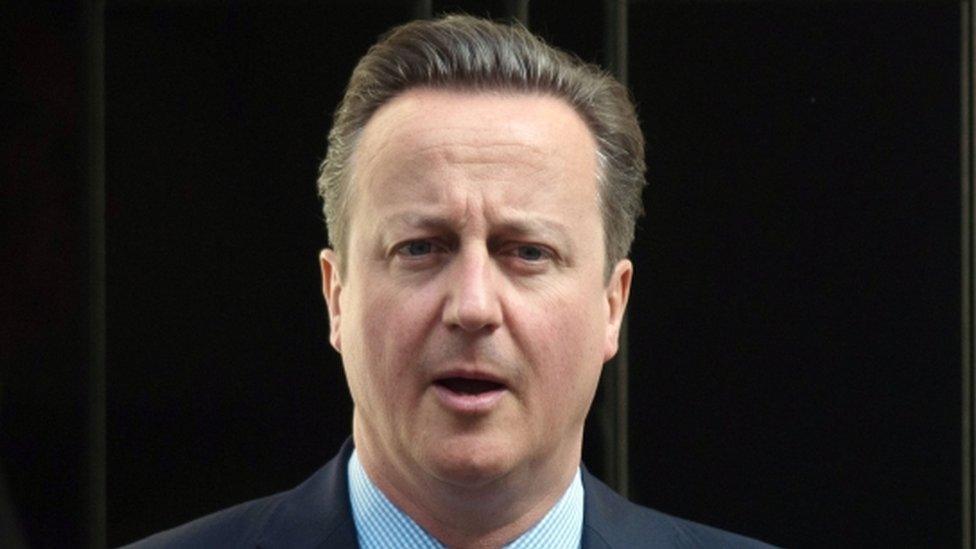The day after a vote to leave the EU
- Published

Leave campaigners Boris Johnson and Michael Gove are likely to play leading roles in Brexit negotiations
This week's referendum has been billed as a historic moment; a cross on the paper sketching out the country's future identity and its place in the world.
Yet, for many people, the choice remains complex and confusing and the way they vote may well be settled by gut and instinct.
The Leave camp promises to regain control over borders and democracy.
The Remain camp says staying in the EU and the single market is clearly in Britain's economic interest.
But there is much that remains unknowable, including what would follow a vote to leave the EU.
In the immediate aftermath of a win for Brexit, some political battles would have to be resolved first.
Would the prime minister stay in office having lost a referendum?
Some would want him out but others in the Leave campaign regard David Cameron as best placed to lead what would be difficult negotiations with Brussels.
Secondly, the early days after the vote would be aimed at settling nervous financial markets.
On the day after, nothing would have changed legally but the government and whoever was in charge of the negotiation would have to decide what strategy to adopt.
Vote Leave sets out post-Brexit plans
After the EU referendum: What happens next?
EU referendum: All you need to know
The legal process for leaving the EU is set out in Article 50 of the Lisbon treaty, external.
David Cameron or whoever was prime minister would have to notify the European Union of the UK's intention to leave.
Once that application has been registered, the clock starts ticking; the negotiation has to be settled in two years.
But Michael Gove, for the Leave campaign, has suggested negotiating a new deal would take at least four years.
The two-year period can be extended but only if all the other 27 EU countries agree.
During the negotiating period, the UK would stay in the EU and EU laws would remain in force.
If there was no deal within the two year period then the UK would have to rely on World Trade Organisation rules.
The Director General of the WTO says this would be far from straightforward. There would have to be negotiations between the UK and the WTO's 161 members.
Catherine Barnard, professor of European Law at Cambridge University, says that without an agreement in those two years "we fall out of the EU, in probably a rather disorderly fashion".
She points to the sheer number of issues that would need addressing.
"Think of European migrants living here," she says.
"What will be their rights going forward?"
But nothing here is straightforward.
Some in the Leave camp want to avoid Article 50 altogether; they would prefer to engage in inter-governmental negotiations.
They do not want to be locked into a timetable.

Jean-Claude Juncker has warned the EU will take a tough line with the UK in the event of vote to leave
It is also uncertain how other European leaders and officials would respond to this.
Their big fear is contagion; that other countries could follow the UK example.
So, they could be inclined to make the UK sweat.
As the President of the Commission, Jean-Claude Juncker said: "Deserters would not be treated kindly.", external
However, there would be strong pressure from Europe's businesses to deal with the UK swiftly and perhaps enter into a transitional agreement.
So, it is unclear what tactics the government would employ and how soon talks would begin.
The Leave campaign has promised to leave the EU by the next election - in May 2020.
Some in the Leave campaign want to move much more quickly and repeal the European Communities Act that establishes the supremacy of EU law.
There might be, however, legal challenges to such a move, and other European countries could be fiercely resistant to the UK unpicking EU laws before a withdrawal agreement has been concluded.
There is likely to be a twin-track process, with one agreement to leave and another to govern future trade.
During the campaign, it has not been established which trade model, if any, the Leave camp favours.
Some have proposed exiting the single market, because the price of staying would be accepting rules such as freedom of movement.
They are in favour of striking a UK-EU free trade deal.
But how long would that take?
And, then, further down the road, there would be the sifting of EU directives to determine which should be kept and which ones dropped.

Would David Cameron stay on a Prime Minister following a Brexit vote?
Then, there is the politics.
Three-quarters of MPs support EU membership, and yet they would have to vote to repeal legislative ties with Brussels.
Prof Damian Chalmers, from the London School of Economics, says it is unclear "what we would be negotiating about… what is the clear British interest".
People, he says, want different things and the sifting process would not be done in this Parliament or the next.
And once a deal - both for withdrawing and for trade - had been concluded with Brussels, would that need to be put to the people again?
There are many denials, but Europe has a history of second referendums.
Boris Johnson has said: "Out is out… get out, and, then, negotiate a series of trade arrangements around the world.", external
So what would "out" look like?
No-one really knows.
Only Greenland has left, and that was 30 years ago.
And what if the vote is very close?
Say the difference is just 30,000 votes.
How final would that be?
Would it have settled the argument for a generation or would there be gridlock at Westminster as each piece of legislation is argued over?
"What happens after?" is just one of the complicated questions voters have been struggling with amid the noise of campaigning.